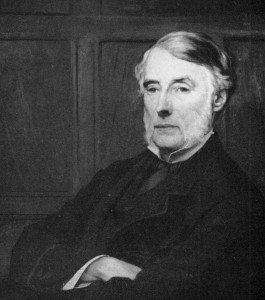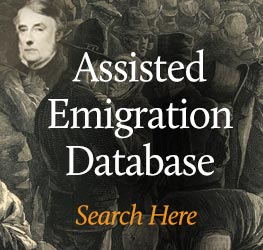 Many people have played important roles in the life of Connemara over the centuries; some have had a negative impact on the people and the landscape, while others have played a positive role in our history. Most of these have been forgotten, or are known to very few. We have a duty to keep their memories alive, even if only to learn from their mistakes. But there are some we should honour because of the good they brought to the area or the help they provided during times of greatest need and one of these is James Hack Tuke.
Many people have played important roles in the life of Connemara over the centuries; some have had a negative impact on the people and the landscape, while others have played a positive role in our history. Most of these have been forgotten, or are known to very few. We have a duty to keep their memories alive, even if only to learn from their mistakes. But there are some we should honour because of the good they brought to the area or the help they provided during times of greatest need and one of these is James Hack Tuke.
James Hack Tuke was a Quaker, born in York on the 13th September 1819 and throughout his long life he was to be a great friend to the poor and the oppressed in England, Ireland and farther afield. His early life prepared him for the role he was going to play in later years. He was related by marriage to the Ellis family and would have been involved in their move to Letterfrack.
Tuke travelled extensively throughout the west of Ireland compiling reports on the conditions he encountered around the time of the Great Famine. His reports gave a clear picture of the state of the poor, but also made suggestions as to what should be done. He wasn’t afraid to put his hand in his own pocket and help out when the need arose. His reports were listened to and various committees were set up to help the people of the west coast of Ireland. The problems of hunger and poverty didn’t go away after the Great Famine. There were some good years, but those particular years in the latter half of the 1800’s saw famine occurring time after time. The failure of the potato crop in the late 1870’s, along with overpopulation and poverty were a huge crisis in the area. Because of that Tuke came up with the idea of assisted emigration from the west. This well thought out scheme took place during the years 1882, 1883, and 1884. The Tuke Assisted Emigration Scheme saw over 1,300 people emigrate from the Clifden Union to America and Canada in 1882, and over 6,000 are estimated to have had their passage paid over the 1882-1884 period. This represented 12% of the Connemara population at the time.
Throughout 2014, a group under the auspices of the Clifden 2012 banner, with the assistance of Galway County Council Heritage Office are preparing to honour James Hack Tuke and to explore the work he undertook. Initial research will concentrate on the first sailings from the year 1882, the year that the majority of people left the Clifden Union. We will investigate the ships manifests and hopefully learn the stories of these emigrants. We want to learn of their lives in America and Canada, but we also hope to learn something of those left behind. An online searchable database, listing those that emigrated, will be compiled and will be developed as a research and a genealogical resource.
Do you have ancestors who emigrated from the area during the years 1882-1884 through the Tuke Assisted Emigration Scheme? You are welcome to contact us by email to info@clifdenheritage.org or by phone to 087-9017406. We welcome anyone with an interest in this project to join us in our exploration of this shared history.
As well as researching all of the emigrants, a conference will take place from Friday, 31st October to Sunday 2nd November in Clifden. The conference will look at life in 19th century Connemara, the assisted passage scheme, and some of the emigrant stories. Among our speakers at this seminar will be Dr. Gerard Moran, Prof Gearoid O Tuathaigh, Prof Christine Kinealy and Dr. Regina Donlon, Breandan O’Scanaill, Kathleen Villiers-Tuthill and Irene King Staunton.




Me and my husband John Joseph Burke, tried really hard to repatriate his parents back too Clifden, through the Irish Centre, in 1989-92. They tried very hard to get them somewhere to live out their last few years, unfortunately the local council at the time had nowhere fort hem to reside.
John Burke Senior and Nora Burke nee O’toole never got their wishes, they are buried in east London.
We still have family living in clifden and the outskirts. Would love to know more about The Burke and O’toole families, I do know that they both lived out on the Islands before settling in Clifden, then London.
Hello there. Sorry to read about the above. Wonder if there is a connection, however. Our great grandfather and large family lived in Clifden around the turn of the last century and some may still do.
He was William Burke, railways manager, and grandfather Joe Burke was trained there as a deep sea diver before emigrating here to Scotland. Any thoughts?
Regards,
Gerry Burke
Have you any history written by Mr. Tuke, on the Swinford Union famine times?
Our town, Charlestown.”Sonnagh” was in the old Swinford Union.
Thanking you,
Cathal Henry.
Finally….a true Irish Hero…The Quaker Christian…the most reverend James Hack Tuke…….Taller and more Christian than the Pope Himself…GOD BLESS YOU SIR…..I wonder why I never learned about you as a kid in Cork Schools,,,,especially Historic Irish heroes……..YOU WERE THE GIANT WE NEVER HEARD OF…….PATRICK MURPHY
My great-great-grandparents, Patrick and Bridget Reddam, of Slieveroe, County Sligo, and 4 of their children, arrived at Boston aboard the SS Phoenician, on or about 16 May 1884. According to the Blacksod Bay Assisted Emigration of 1880’s Database, this journey was part of the James Hack Tuke Assisted Emigration program. However, the Reddams aren’t in this database, which lists passengers who boarded the ships in Blacksod, County Mayo. According to the passenger list filed on arrival in Boston, on this journey, the ship also took on passengers in Glasgow, Galway and another port whose name I can’t make out (it almost looks like “Woville”). Are records also available of passengers who boarded at Galway or another port of call? I greatly appreciate any help you can provide.
Marilyn-
My 2x great grandparents (Patrick and Honora Casey of Mweenish Island) have a similar situation. They arrived to Boston 24 April 1884 on the SS Canadian, which is also listed on the Blacksod database. They, too, are not listed in the database.
I’m assuming (and would love a correction if anyone has any additional information) that they just happened to be on the same ship. I’d always assumed they got on in Galway (though Blacksod wasn’t a whole lot further away from them.)
Michelle, from the website:
http://www.blacksodbayemigration.ie/
I wrote the email contact provided there. I learned from the very helpful historian there that my ancestors boarded the ship in Moville, Donegal. This historian had a more detailed version of the passenger list that had notations of relatives already in Boston, and the amount of money my ancestors traveled with. The more I read about the Tuke scheme, the more I wonder why my folks were included. They weren’t the usual Tuke emigrants, in that they were from Sligo (not Galway or Mayo) and they remained in Boston, rather than traveling on to another place. I’m still looking for more answers! Good luck.
I’m only seeing this reply now, but thank you! I will try contacting that website to see if they have any more information on my relatives.